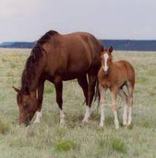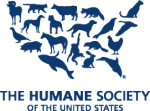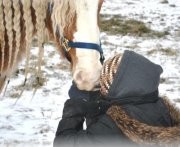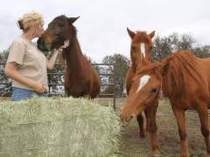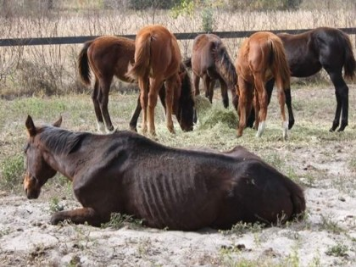Horse Slaughter in the United States
Horse slaughter
Wikipedia
Horse slaughter is the practice of slaughtering horses to produce meat for consumption.
Human beings have consumed horse meat since the earliest days of human history: the oldest known cave art, the thirty-thousand-year-old paintings in the Chauvet Cave of modern France, show horses prominently alongside other wild animals hunted by humans.[1] The later domestication of the horse is widely held to have been initiated for the purposes of raising horses for slaughter for human consumption.[2] However, modern horse slaughter has become highly controversial in many parts of the world, based on a multiplicity of concerns: e.g., whether horses are or can be managed humanely in industrial-scale slaughter; whether horses not purpose-raised for consumption are likely to yield safe meat; whether it is appropriate to consume a creature that has become a companion animal in affluent societies.
Horse meat is a quite dry meat to cook, it is common to add some extra fat from other animals (like bacon) to increase its softness when roasted. Read more
Feds: Wild horses sent to slaughter, not pasture
Feds: Wild horses sent to slaughter, not
pasture
Trevor Hughes, USA TODAY
October 24, 2015
DENVER — Federal officials improperly sold more than 1,700 wild horses to a man who illegally sent them to Mexico to be slaughtered for meat instead of turning them out to pasture as promised, a new report says.
Colorado-based workers with the Bureau of Land Management allowed livestock hauler Tom Davis to buy nearly 1,800 wild horses rounded up from public lands between 2008-20012, paying about $10 each. He admitted he then turned around and sold the horses to be slaughtered in Mexico, earning thousands of dollars in profits, the Department of the Interior’s Office of the Inspector General found.
"Davis opined that in selling him so many loads of horses, BLM had to know that the horses would end up at a slaughterhouse," investigators wrote.
BLM workers said Davis, a Coloradan, repeatedly assured them he was buying the horses as part of a tax write-off for wealthy friends, and that he promised them the horses wouldn’t be sent to slaughter. The Inspector General's report said BLM officials looked into complaints made about Davis but never found any evidence he was breaking his promise.
Wild horses are an iconic symbol of the West, and their handling has long been politically touchy. Land managers say the herds can grow too large for the lands they roam and must be managed through sales or euthanization. But critics have made land mangers nervous enough that they ignored laws allowing them to kill horses or sell them to any willing buyer, calling it "political suicide" to take such actions.
The report also noted that BLM spent more than $140,000 delivering the horses to Davis, the agency’s single-largest buyer of wild horses, which is far less than he paid for the animals.
BLM officials said they have changed their policies, and no charges are being brought against Davis. Read more
Show horse slaughtered in Florida — likely for meat
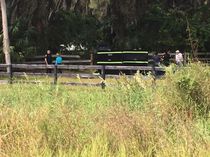 Deborah Stevens, the owner of Centennial Equestrian Farm, called law enforcement after making the discovery.(Photo: WTSP)
Deborah Stevens, the owner of Centennial Equestrian Farm, called law enforcement after making the discovery.(Photo: WTSP)
Show horse slaughtered in Florida — likely for meat
USA Today Network Garin Flowers WTSP-TV, Tampa-St. Petersburg
October 27, 2015
PALMETTO, Fla. — A show horse imported into the United States from Germany last week was found butchered just yards from his new home, authorities said Monday.
Debbie Stephens, one of the owners of Imperial Farms Equestrian Center and a champion rider, noticed that her new French chestnut jumper, a 12-year-old gelding named Phedras de Blondel, was missing Sunday from his stall. A search led to a broken fence, and then came the horrific discovery.
"(They) just dismembered him right there and just left his rib cage and his neck and head," said Stephen's husband, Steve Stephens. "All four legs were cut off of him. I don't mean at the knee, I mean from his shoulder.
Investigators believe that the horse was slaughtered sometime between 8 p.m. Saturday and 6:45 a.m. Sunday for its meat.
"What they did to this horse had nothing to do with his value," Debbie Stephens said. She would not disclose the price she paid for the horse, but show horses can sell for tens of thousands of dollars. "It’s one of the cruelest things that could happen to any horse. This just turned my life around."
Horse meat is illegal in Florida, but a black market for it exists, said Nick Atwood, a spokesman for the Animal Rights Foundation of Florida. During the 2010 Florida Legislative Session, he said a bill passed that strengthened the state’s restrictions on the sale of horse meat for human consumption.
It is now illegal in Florida to sell, purchase, distribute, transport or possess horse meat unless "it is clearly stamped, marked, or described as horse meat for human consumption." However, no U.S. slaughterhouses now process horse meat, making it difficult to obtain legally.
Debbie Stephens is a veteran show jumper and holds the women’s high jump record of 7 feet, 8 inches. Her husband was a co-designer of the show jumping courses for the 2008 Olympic Games in China.
"This was a murder," Steve Stephens told Dressage-News. "If I had to make a guess, it was someone who knows how to hunt, like hunt deer, and knew how to take a large animal’s life quickly. We have no enemies. We have no idea who did this."
The couple and others have raised more than $18,000 toward a reward they hope will lead to an arrest. Manatee County Sheriff’s deputies say that’s what it will take to crack the case.
"It's a horrible crime scene, and obviously for the owner to have to go through this is just absolutely terrible," said Dave Bristow, spokesman for the Manatee County Sheriff's Office.
While eating horse meat is generally taboo in the U.S., it is common in dishes in some Caribbean and European countries. Atwood said some people living in the U.S. are willing to pay top dollar. Read more
UPDATE: Horse slaughter blocked by federal law
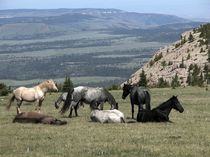 Wild horses are seen at the Pryor Mountain National Wild Horse Range in south-central Montana.(Photo: Bureau of Land Management)
Wild horses are seen at the Pryor Mountain National Wild Horse Range in south-central Montana.(Photo: Bureau of Land Management)
Horse slaughter blocked by federal law
USA Today, Barry Massey
AP Business Writer
January 17, 2014
Obama signs budget measure that withholds money for required federal inspections of slaughter process.
SANTA FE, N.M. (AP) — The resumption of commercial horse slaughter in the U.S. was blocked Friday as President Obama signed a budget measure that withholds money for required federal inspections of the slaughtering process.
Although the measure provides temporary funding for the federal government, it stops the Agriculture Department from spending money for inspections necessary for slaughterhouses to ship horse meat interstate and eventually export it to overseas consumers.
"This clear message from Washington echoes the opinions of an overwhelming number of Americans from coast to coast: horse slaughter is abhorrent and unacceptable," said Matt Bershadker, president and CEO of the American Society for the Prevention of Cruelty to Animals.
The president's action came as a New Mexico judge granted a preliminary injunction against a Roswell company from moving forward with its plans to start slaughtering horses.
The ruling by state District Judge Matthew Wilson will keep alive a lawsuit by Attorney General Gary King, who's seeking to permanently block horse slaughter in New Mexico. The lawsuit could serve as a possible insurance plan in case the federal government provides inspection funding in the future.
Blair Dunn, a lawyer for Valley Meat, said the company will continue to wage a legal fight to convert its cattle processing plant to the slaughtering of horses. He contended that the federal move to withhold money for meat inspections could cause U.S. trade violations.
"I don't see them opening now. No matter what, they are not going to violate the law," said Dunn, who also represents a plant in Missouri that wants to produce horse meat.
The last domestic horse slaughterhouses closed in 2007, a year after Congress initially withheld inspection funding. After federal money was restored in 2011, plants in New Mexico, Missouri and Iowa began trying to start horse slaughtering.
King's lawsuit contends that the Roswell company's operations would violate New Mexico's environmental and food safety laws.
Valley Meat is trying to disqualify the judge who's handling the case because of comments posted by horse slaughter opponents on a Facebook page for the judge's election campaign. Wilson issued an order Friday saying he would consider setting a hearing on the company's request. Read more
A Timeline of Horse Slaughter Legislation in the United States
The complicated legal issue of horse slaughter for human consumption has been debated in U.S. courts and Congress for years. By Leslie Potter | March 2012 Extra
The horse slaughter argument has heated up in recent months since the 2012 appropriations bill was approved without a ban for horse meat inspections. But this isn't the first time the horse slaughter debate has been a hot topic. The timeline below lists some of the key dates in the United States horse slaughter industry.
Updated January 2014
Horses could soon be slaughtered for meat in U.S.
Horses could soon be slaughtered for meat in
U.S.
USA Today
By Deirdre Shesgreen, Gannett Washington Bureau
December 1, 2011
Note: The USA Today story was removed. However WZZM 13 ABC also published the story.
WASHINGTON -- Congress has lifted a de facto ban on the slaughter of horses, a move hailed by Missouri farmers and state political leaders who say the prohibition had
inadvertently caused more harm to the animals than good.
But some animal-rights activists decried the little-noticed provision, which sailed to passage earlier this month and was signed into law by President Barack Obama on
Nov. 18. And they vowed to keep the issue alive, pressing for an outright prohibition of horse slaughtering in the U.S.
At issue is a ban, first enacted in 2006, that prevented the U.S. Department of Agriculture from using federal funds to inspect any meat processing plants that slaughter
horses. Plants that are not inspected by the USDA cannot ship meat across state lines, so the provision effectively ended domestic horse slaughter.
There is no U.S. market for the human consumption of horse meat. But it is seen as a delicacy overseas, especially in some European and Asian countries. In addition, horse meat has been used in the U.S. to feed zoo animals, because it's a good source of protein.
Farmers and some policymakers say the ban resulted in old horses being abandoned and neglected. In response, Sen. Max Baucus, D-Mont., successfully pushed for a provision requiring the non-partisan Government Accountability Office to study the impact of the ban. The GAO study, released in June, highlighted the concerns of Baucus and others.
The GAO report concluded that the slaughter of American horses didn't stop because of the ban, but simply shifted to Mexico and Canada. "From 2006 through 2010, U.S. horse exports for slaughter increased by 148 and 660 percent to Canada and Mexico, respectively," the GAO report states. "As a result, nearly the same number of U.S. horses was transported to Canada and Mexico for slaughter in 2010 -- nearly 138,000 -- as was slaughtered before domestic slaughter ceased."
In addition, horse prices declined for those animals most likely to be bought for slaughter, the report concluded. The GAO said that comprehensive data was not available on abandonment and neglect, but that state and local governments, along with some animal welfare groups, reported an increase in investigations of such incidents since 2007. "State, local, tribal, and horse industry officials generally attributed these increases in neglect and abandonments to cessation of domestic slaughter and the economic downturn," the GAO stated.
The agency suggested that Congress should either reconsider restrictions on the use of federal funds to inspect horse slaughtering facilities or consider a permanent ban of horse slaughtering. Animal-rights groups have long pressed for the latter option -- and they hope they now have their opening.
Wayne Pacelle, president and CEO of the Humane Society of the United States, said he thinks that if horse slaughter plants reopen in the U.S. that will provide "juice" to the society's effort to pass a ban on the practice.
He said he agreed with GAO's conclusion that the federal USDA ban has not stopped horse slaughtering. But he questioned the contention that it has led to more abandonment or neglect of horses.
"It's largely fabrication," Pacelle said. He said that if about the same number of horses are being exported to Canada and Mexico for slaughter as were killed in the U.S. before the ban, it doesn't add up that there is also a spike in abandonment.
The lawmakers who have embraced the GAO study are "slaughter proponents," he charged. "And that they are crying crocodile tears over abandonment is essentially a cynical and hypocritical line of argument. And it's a little too convenient."
But for critics of the USDA ban, the GAO study provided the evidence they needed to move forward with repeal.
As the 2012 agriculture appropriations bill moved through Congress this year, Rep. Jack Kingston, R-Georgia, moved to strip out the USDA funding ban. A spokesman for Kingston, who is chairman of the House agriculture spending subcommittee, said the provision was ineffective in stopping slaughter, but it did kill jobs.
"It's a $65 million industry in America -- it was before it was banned," said Chris Crawford, Kingston's spokesman.
The Humane Society and other groups say they think the repeal will prompt renewed interest in the American Horse Slaughter Prevention Act of 2011, which would ban the interstate transport and live export of horses for slaughter for human consumption. The bill was introduced earlier this year by Sens. Mary Landrieu, D-La., and Lindsey Graham, R-S.C. There is companion legislation in the House.
The measure has been introduced in previous sessions, but could pass this time, Pacelle said, if there's fresh evidence of horse slaughter in the U.S.
"I think what will happen now is we will see cosponsoring of both bills accelerate as there's more talk of opening slaughter houses in the United States," he said. Read more
Print_-_Horses_could_be_slaughtered_for_[...]
Adobe Acrobat document [56.5 KB]
Claim: Legislation passed by the U.S. government allows horses to be slaughtered for food in that country. TRUE
The Humane Society
End Horse Slaughter
Each year, tens of thousands of American horses—riding horses, carriage horses, race horses, wild horses, and children’s ponies—are inhumanely transported and
slaughtered, their meat shipped to places like France, Italy, and Japan for human consumption. Help us end horse slaughter.
Humane Society of the United States
Wikipedia
The Humane Society of the United States (HSUS), based in Washington, D.C., is the largest animal advocacy organization in the world. In 2009, HSUS reported assets of over
US$160 million.
The journalist Fred Myers and three others founded HSUS in 1954 to address what they saw as cruelties of national scope, and resolving animal welfare problems by applying
strategies beyond the ability of local organizations. HSUS operates animal sanctuaries in five states. It does not run local shelters or oversee local animal care and control agencies, but promotes
best practice and provides assistance to shelters and sheltering programs. The group's current major campaigns target five issues: factory farming, animal fighting, the fur
trade, puppy mills, and wildlife abuse.
HSUS publishes Animal Sheltering, a bi-monthly magazine for animal sheltering professionals. HSUS distributed
the magazine to more than 450,000 people in 2009. It also operates the Humane Society Veterinary Medical Association, which provides free
veterinary services for animals in impoverished communities.
Despite widespread support for a ban on domestic horse slaughter by horse professionals, Veterinarians for Equine Welfare (VEW) and the American Veterinary Medical Association (AVMA) have criticized HSUS and other organizations who lobbied for an end to horse slaughter in the United States, stating that instead of making things better "horses are being abandoned in the United States or transported to Mexico where, without U.S. federal oversight and veterinary supervision, they are slaughtered inhumanely. Read more
Humane Society of the United States, Official Website
PETA - People For The Ethical Treatment of Animals
Almost all of us grew up eating meat, wearing leather, and going to circuses and zoos. We never considered the impact of these actions on the animals involved. For whatever reason, you are now asking the question: Why should animals have rights. Read more
American Horse Slaughter Prevention Act of 2011, Senate bill S.1176
American Horse Slaughter Prevention Act of 2011, House bill H.R. 2966
What Do You Think? What’s your position on The American Horse Slaughter Prevention Act? POPVOX
Animal Welfare Institute
Horse Slaughter, on Facebook
by Amanda Gray
Comment by riverlighttrider, on YouTube
"As a young girl I remember a neighbor who took in horses for slaughter. I remember hearing them all night before they were killed. They knew it was coming. I was told
they were mostly horses people could not afford to keep. Many were young and healthy horses. Few were old and sick They became dog food. Once there was a prize stallion that the man who owned the
land had kept on trying to sell him... I was very young but never forgot this. They used a sledgehammer between the eyes to kill them."
SAVING AMERICA'S HORSES is an intelligent and hard hitting expose` that explores the
human-animal bond of horse and man through an illuminating humanitarian lens.
"The film paints a clear picture of how government agencies and corporate interests run over the laws that are supposed to protect the horses. The film challenges us as
viewers to require accountability from our leaders by weaving in an underlying and lingering message that our horses and our very souls may depend on it."- Laura Allen Animal Law
Coalition"
SAVING AMERICA'S HORSES sends a life-changing and lingering message to the public about the need to protect America's horses, and it brings a voice to America's leading
equine welfare professionals who are putting the safety and welfare of our horses first. Read more
NBC | Horse Slaughter 2011
Facility rescues horses locked up for 2 years
Facility rescues horses locked up for 2 years
Ocala Star-Banner
February 15, 2012
Left: Theresa Batchelor of Beauty's Haven Farm and Equine Rescue tries to get Paso Fino mares accustomed to being around her at a farm where she has taken on the
rescue of 37 horses in Anthony on Wednesday.
Theresa Batchelor has seen many abused horses during the six years she has run Beauty's Haven Farm & Equine Rescue in Morriston. Then two weeks ago the rescue
facility took on what Batchelor described as a "heart-breaking" case: 37 neglected Paso Fino horses, more than a third of which had been locked in their stalls for the past two years.
"They were living in the dark for two years," Batchelor said.
The abuse of being confined in a 12–foot by 12-foot stall was something Batchelor said she had never seen before. She considers it psychological abuse as well as physical
neglect.
- Beauty's Haven Farm & Equine Rescue Blog
- Beauty's Haven Farm & Equine Rescue Website
The treatment also has taken its physical toll. Some of the horses weighed only half of what a healthy animal would weigh. And most of the horses hadn't had their
hooves treated or their coats cleaned, leaving them dirty and in pain.
The other horses were left outside with almost no human contact and to compete with one another for limited food, leaving many starving, Batchelor said.
The rescue facility said it needs financial help and food donations while the horses are brought back to health and prepared for adoption. Batchelor said Beauty's Haven
already was caring for nearly 40 other horses. The new batch is straining resources.
The newly acquired horses are being cared for at the farm where they have lived, but rescuers only have about two weeks of food left.
Despite the abuse, Batchelor said the horses are slowly improving. But it's still difficult to touch them. She said the animals don't have any apparent bad habits,
despite the way they have been treated. She doesn't expect to euthanize any of them. Read more
If you would like to volunteer or to make an appointment, please call 352-258-9309.
Silver Trinket, a 12-year-old mare, lies in the sand at Morgan Silver's farm. Morgan Silver, who heads the Florida Horse Protection Association, said she is seeing a new trend as prices for thoroughbreds are plummeting. Silver recently rescued 23 thoroughbred mares and their babies whose owners couldn't support them.
Horses once highly valued now starving amid economic
downturn
By Fred Hiers, Ocala Star Banner
December 2, 2010
For many horses, the Great Recession has become the great equalizer, leaving once valuable horses starving regardless of pedigree or the money they once earned for their owners. Many are unwanted or
in the possession of owners who can't afford to care for them. Eventually, like deteriorating hand-me-downs, they end up at the Florida Horse Protection Association in Micanopy waiting for someone to
adopt them. In many cases, they were bought for just pennies on the dollar by novice horsemen hoping to strike it rich breeding aged mares for a chance at owning a winning offspring. Read more






